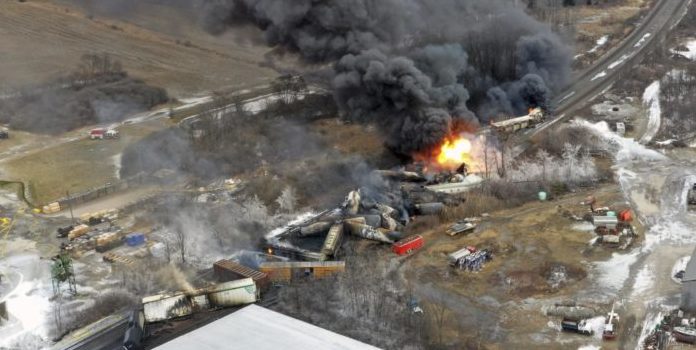(Ken Silva, Headline USA) Known in some circles as the Department of Energy’s “worst nightmare” due to his dogged pursuit to hold the DOE accountable for its nuclear contamination of a community in southern Ohio, PhD chemist Dr. David Manuta is now turning his attention to the toxic Norfolk Southern train derailment site in East Palestine.
In an exclusive interview with Headline USA, Manuta said he’s being considered by Ohio Gov. Mike DeWine’s office to serve on the state’s emergency response team. If appointed, Manuta said he plans on asking some hard questions about how Norfolk Southern and the array of government agencies have handled response efforts thus far.
For starters, Manuta wants to know the methodology underpinning Ohio EPA tests that supposedly show East Palestine’s air is safe to breath and its water is safe to drink. As someone who’s served as an expert witness in numerous environmental legal disputes, Manuta said he’s seen how companies and government agencies can underreport contamination levels.
“The dirty little secret is they probably took static samples, meaning they didn’t do any mixing; they didn’t do any stirring,” he said. “A static sample is only representative of where it was taken, whereas a mixed sample would stir up all the toxins and be captured in the measurement.”
Not only should soil be stirred and water mixed before testing; air samples should be taken after trains pass by and their vibrations kick up dust, according to Manuta.
The Ohio scientist also questioned the initial decision to conduct a “controlled release” of the vinyl chloride into prepared pits before burning it into the atmosphere. This decision produced phosgene gas, which was banned under the Geneva Convention after killing about 85,000 people in World War I.
While burning the 1 million-plus pounds of vinyl chloride may have been preferable to letting it seep into the ground, Manuta wonders why officials were so quick to opt for an open-air burn of all the chemicals at once. Giant tents or other enclosures over the burn pits—or over the train cars—could have captured at least some, if not the vast majority, of toxic plumes released into the air, he said.
Manuta cautioned that he doesn’t have all the facts that underpinned Norfolk Southern’s decisions. Perhaps officials chose the best of all possible options in handling the disaster, he said.
But given their lack of scientific credentials, Manuta said he doubts that officials followed the science.
He noted that the head of the Ohio Health Department is a medical doctor and not a toxicologist, while the leader of the Ohio EPA is a lawyer.
Moreover, the National Transportation Safety Board official leading the federal investigation, Michael Graham, has a background in aviation.
“Mr. Graham has excellent credentials in the aviation industry, but I can neither see where this experience qualifies him in a rail disaster nor in a response to chemical fire,” Manuta said, adding, “The cynical me identifies Mr. Graham as a political appointee.”
Luckily for residents of East Palestine and the surrounding area, Manuta said Governor DeWine seems intent on establishing a body of scientific experts to make up for the lack of expertise in his administration, and for the lack of help from federal agencies.
But whether Manuta will have the power to make a difference remains to be seen. He said he doesn’t know what investigative authority he’ll have as a member of DeWine’s task force.
“Normally, when I do investigations, my client will ask me what I need. I make a shopping list and they do a discovery and disclosure requests,” he said, referring to the process for criminal and civil cases.
“Here, I don’t know what authority will be vested in me.”
Ken Silva is a staff writer at Headline USA. Follow him at twitter.com/jd_cashless.

